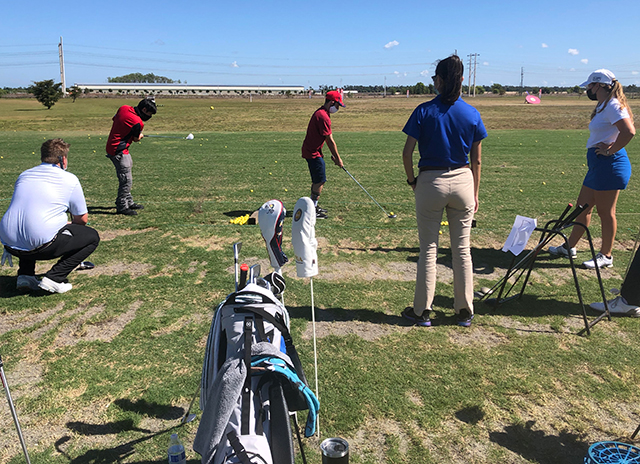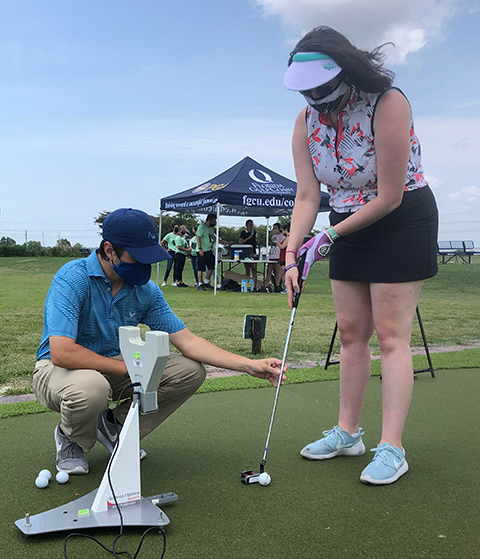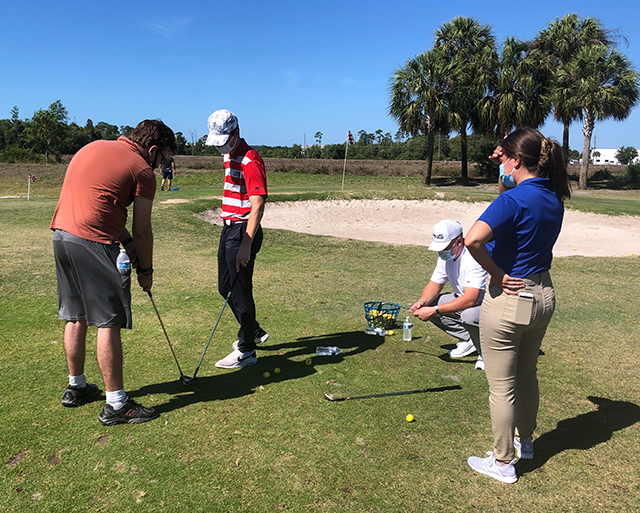Stephanie Maffeo never envisioned herself as a golfer, but after participating in an interdisciplinary research project coordinated by Florida Gulf Coast University students and faculty, she plans to continue learning and playing the game for years to come.
Putting Along the Spectrum, which took place this spring, provided young adults diagnosed on the autism spectrum with the education and skills to help them gain comfort and confidence on the golf course. At the same time, both PGA golf management (PGM) and occupational therapy (OT) students from the university used the instruction as a research opportunity.

The program was created by a partnership between the two FGCU programs and the Community Autism Network with Maria Colmer, Ph.D., associate professor in rehabilitative sciences, taking the lead. The goal: “to engage them in the leisure activity of golf with the main focus of increasing their social skills.”
“Individuals diagnosed with autism tend to avoid social gatherings and physical activities. We wanted to introduce and expose golf to those who might not try it in the hope they develop a love for the game, and where better to do that than in Southwest Florida?” Colmer said.
Golf tends to be an individualistic sport often played in a group setting. The format of Putting Along the Spectrum encouraged participants through instruction in a game that requires the kind of social interaction and physical activity that those living with autism might avoid.
Maffeo, a 29-year-old Naples native, was thankful for the opportunity the program provided. “Golf helps you focus, and it also gets you outside to enjoy exercise with your peers,” she said. “I thoroughly enjoyed Putting Along the Spectrum, and I will continue to take golf lessons.”

The four-session April event was held at Alico Family Golf, located a few miles northwest of the university’s main campus and a frequent partner and sponsor of FGCU. Each session was tailored to a different aspect of golf such as driving, chipping and putting.
Hunter Hoffman, a senior PGM major, instructed participants throughout the event. A part-time instructor at Quail Creek Country Club in Naples, Hoffman said, “I noticed over the weeks that these students have been more outgoing with our teaching professionals and more amped to conversate. It’s been awesome to see.”
As part of their research, Hoffman and fellow PGM students used what’s known as the SAM (Science and Motion) PuttLab, technology that tracks and analyzes a golfer’s putting stroke over time. The results noted overall improvements in participants’ aim, strike and ball launch.
But the goal was also, as Hoffman put it, to increase participation in golf “because this is a game they can carry for the rest of their lives.”
That’s what happened with another participant, Emily Phillips, who used the program as a way to turn golf into her new hobby.
“I use this opportunity to practice talking with people and learning how to listen and be more comfortable, as I am very shy,” Phillips said.
On the flip side of the program’s partnership were Colmer’s students, including Grace Precord, who’s earning a master’s in OT. “Our research was conducted to examine how designing a program that uses teaching and learning styles effective for individuals with autism could improve the participants’ social skills and social interaction satisfaction,” Precord said.

While most of the data from both FGCU programs is still being evaluated, the relationship between the OT and PGM students made Putting Along the Spectrum impactful even without the research benefits.
“An aspect I like about this collaboration was the golf management students were also getting educated by my occupational therapy students on effective ways to instruct individuals diagnosed with autism. They will be able to reference this information down the road and become more effective as golf pros working with this population,” Colmer said. “It’s a twofold kind of deal. Not only do the participants benefit from the experience, but students benefit from it as well.”
The FGCU facilitators consider the pilot program a success with seven of the original participants staying with it from start to finish. They hope to make Putting Along the Spectrum an annual collaborative event.
“Participants expressed to us how they valued the inclusivity of the program,” Precord said. “Having had a positive experience from Putting Along the Spectrum, we are hoping the participants will seek other opportunities in the community, or even lead the creation of such.”
‑- Tyler Watkins is a senior journalism major at FGCU and Tampa resident. He writes for FGCU360.com as part of a student newswriting internship program coordinated by University Marketing & Communications. FGCU students interested in future internship semesters should write Keith Gibson at [email protected] and put “Internship” in the subject line.